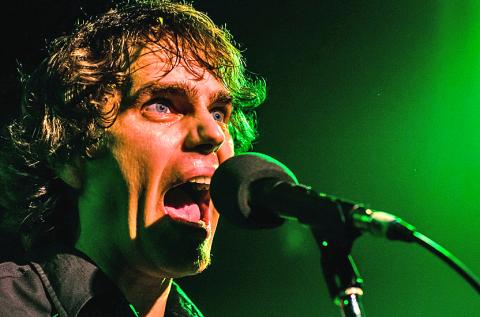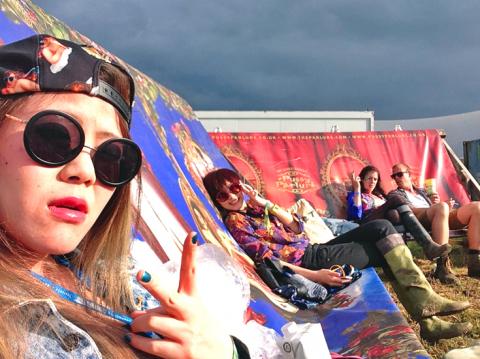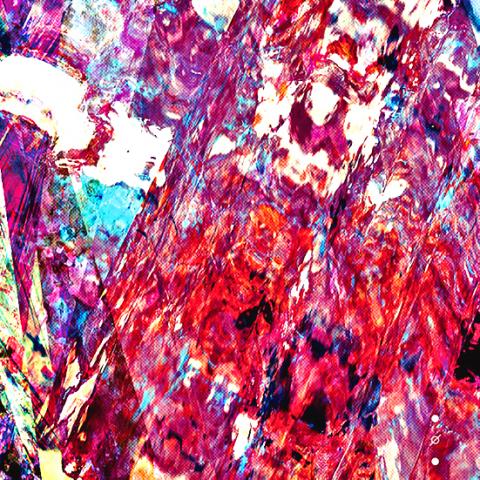With New Years Day already behind us, the upcoming two days are shaping up to be a lost weekend. So rather than fight it, I’ll embrace that feeling of being too-hungover-to-get-off-the-couch, which also happens to be a perfect mental state to look back on Taiwanese live music last year, as well as what’s coming up this year.
The news that’s hot off the presses is that Taipei’s own Muddy Basin Ramblers have been nominated for a Grammy — in CD packaging design. Their album Formosa Medicine Show, designed by the local firm Onion Design, will compete against recent albums by The Pixies, Pearl Jam, FJA Twigs and Passenger for the golden statue of that strangely upright dude. Bandleader David Chen and designer Andrew Wong will fly to LA for the awards ceremony on Feb. 8. Best of luck!
Interesting to note, Taiwan has only ever had Grammy recognition for album art, never for music. Local designer Xiao Qing-yang (蕭青陽) has been nominated four times for music packaging since 2005, but he has never won. Last year’s winner in the Recording Packaging category went to an album by a relatively small band, Reckless Kelly, but previous years saw awards go to major names including Bjork, Arcade Fire, The Black Keys and David Byrne.

Photo courtesy of Ian Kuo
A couple of major music festivals went on hiatus last year, but will back this year. The Formoz Festival (野台開唱), normally held in early August in Taipei, and the Megaport Festival (大港開唱), an annual festival in March in Greater Kaohsiung, both took a break last year following a shareholders’ shakeup at The Wall, a top music promoter.
Megaport, now in the hands of a group headed by Freddy Lim (林昶佐) of the band Chthonic (閃靈), is set to return Mar. 28 and Mar. 29 in Greater Kaohsiung’s Pier 2 District with several Japanese headliners, mostly punk or metal bands. The same weekend in Taipei, The Wall is mounting its own T Fest, which in local slang sounds like a festival for lesbians, though I am assured that is not the case. T Fest headliners will be British and Danish shoegaze bands Yuck and Mew. Both festivals happen just one week before Spring Scream. Can anyone say, “awkward”? Let the music festival wars begin.
The best music festival last year was the Heart Town Festival (山海屯音樂節) in Greater Taichung, and not just because it filled a vacuum. It had the best bands and was the most fun. The music was all raging metalcore, hardcore and punk. It rained hard every afternoon. And I have never in one day seen so many bands instruct crowds to form a wall of death, crouch down then jump up, swirl into a circle pit and so on. But the bands were at the top of their game and the crowd was massively energized. Crossfaith and Dark Rain, a couple of white-hot young bands from Japan, channeled every volt of the massive wattage behind them for butt-kicking shows.

Photo courtesy of Go chic
Most notably, Heart Town Festival was organized by a new promoter, Jimmy Liu (劉鈞輝). A new festival promoter on the scene is definitely a good thing.
After Heart Town Festival, my other best shows last year were the German avant-garde pianist and composer Nils Frahm at Legacy, the Japanese no wave punk girls of the ZZZ’s, also at Legacy, and the Idan Raichel Project, an Israeli band that played at Daniel Pearl Day, albeit without frontman Idan Raichel. Raichel had committed to the gig but at the last minute was called away to New York by Alicia Keys. Yet his band was still a whirlwind of traditional music and neo-soul, and everyone in the front was dancing. Unfortunately they were also the only ones who could hear, as the sound system was badly underpowered.
The best shows I missed was probably The National, which people raved about. Whoops.

Photo courtesy of ovds
The best performance by a Taiwanese band goes to Go Chic at The Wall last February. A Japanese promoter next to me at the show was visibly impressed, and the electro art-rock trio went off to tour Japan just after that show. Go Chic then became the first Taiwanese band to play Glastonbury. Sadly, they have taken an indefinite break, as one band member has some serious personal issues.
Another fantastic band to call it quits last year was the Deadly Vibes. They went out with a final rockabilly sendoff at Revolver in March. For almost a decade, JT Long, JD Long and Jason Copps were pound-for-pound one of the most rocking acts in Taiwan. As expats playing a locally unfamiliar, retro genre, they were perhaps doomed to small rooms and DIY tours, but they still rocked harder, better and with more commitment than anyone.
The best indie albums of the year go to Forests for No Fun, a fuzzy garage punk masterpiece, and OVDS for Heartbreak Resistance, a surprising fusion of dubstep, rap and hardcore.

Photo courtesy of forests
That’s it for last year. A new year is already upon us.

Dissident artist Ai Weiwei’s (艾未未) famous return to the People’s Republic of China (PRC) has been overshadowed by the astonishing news of the latest arrests of senior military figures for “corruption,” but it is an interesting piece of news in its own right, though more for what Ai does not understand than for what he does. Ai simply lacks the reflective understanding that the loneliness and isolation he imagines are “European” are simply the joys of life as an expat. That goes both ways: “I love Taiwan!” say many still wet-behind-the-ears expats here, not realizing what they love is being an

William Liu (劉家君) moved to Kaohsiung from Nantou to live with his boyfriend Reg Hong (洪嘉佑). “In Nantou, people do not support gay rights at all and never even talk about it. Living here made me optimistic and made me realize how much I can express myself,” Liu tells the Taipei Times. Hong and his friend Cony Hsieh (謝昀希) are both active in several LGBT groups and organizations in Kaohsiung. They were among the people behind the city’s 16th Pride event in November last year, which gathered over 35,000 people. Along with others, they clearly see Kaohsiung as the nexus of LGBT rights.

In the American west, “it is said, water flows upwards towards money,” wrote Marc Reisner in one of the most compelling books on public policy ever written, Cadillac Desert. As Americans failed to overcome the West’s water scarcity with hard work and private capital, the Federal government came to the rescue. As Reisner describes: “the American West quietly became the first and most durable example of the modern welfare state.” In Taiwan, the money toward which water flows upwards is the high tech industry, particularly the chip powerhouse Taiwan Semiconductor Manufacturing Co (TSMC, 台積電). Typically articles on TSMC’s water demand

Every now and then, even hardcore hikers like to sleep in, leave the heavy gear at home and just enjoy a relaxed half-day stroll in the mountains: no cold, no steep uphills, no pressure to walk a certain distance in a day. In the winter, the mild climate and lower elevations of the forests in Taiwan’s far south offer a number of easy escapes like this. A prime example is the river above Mudan Reservoir (牡丹水庫): with shallow water, gentle current, abundant wildlife and a complete lack of tourists, this walk is accessible to nearly everyone but still feels quite remote.